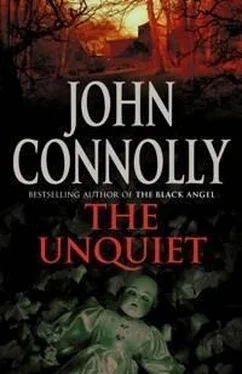“I was having a hell of a day when you called,” he said. “The timing wasn’t great.”
“My timing is often bad,” I said. “And timing is everything.”
“You got it. You still nosing around in the Clay business?”
I told him that I was. He made a face, as though someone had just offered him a piece of bad fish. It was then that he told me about the dead crows.
“Freaked my secretary the hell out,” he said. “She thought it was the work of Satanists.”
“And what about you?”
“Well, it was different, I’ll give it that. Worst that ever happened to me before was a golf club being put through the windshield of my Lexus.”
“Any idea who was responsible?”
“I can guess who you think was responsible: the same guy who’s been giving Rebecca Clay a hard time. I knew you were bad luck the minute I heard your voice.” He tried to laugh it off, but it was clear that he meant it.
“Why would he target you?”
“Because he’s desperate, and my name was all over the documentation relating to her father. I passed on dealing with the probate, though. Someone else is looking after that.”
“Are you concerned?”
“No, I’m not. I’ve done my share of swimming with sharks, and I’ve lived. I’ve got people I can call on if I have to. Rebecca, on the other hand, only has people for as long as she can afford to pay them. You ought to let the whole business go, Parker. You’re just making things worse by stirring up the dirt at the bottom of the pond.”
“You’re not interested in the truth?”
“I’m a lawyer,” he replied. “What has the truth got to do with anything? My concern is the protection of my clients’ interests. Sometimes, the truth just gets in the way.”
“That’s a very, um, pragmatic approach.”
“I’m a realist. I don’t do criminal work, but if I had to defend you on a charge of murder, and you decided to plead not guilty, what would you expect me to do? Tell the judge that, all things considered, I thought that you’d done it, because that was the truth? Be serious. The law doesn’t require truth, only the appearance of it. Most cases simply rest on a version of it that’s acceptable to both sides. You want to know what the only truth is? Everybody lies. That’s it. That’s truth. You can take that to the preacher and get it baptized.”
“So do you have a client whose interests you’re protecting in the matter of Daniel Clay?”
He wagged his finger at me. I didn’t like the gesture, just like I didn’t care much for him calling me by my last name.
“You’re a piece of work,” he said. “Daniel was my client. So too, briefly, was his daughter. Now Daniel is dead. It’s done and dusted. Let him rest, wherever he is.”
He left us to go over and speak with the writer, Jacobs. June imitated Stark’s finger wag.
“He is right,” she said. “You really are a piece of work. Do you have any conversations that end happily?”
“Only with you,” I replied.
“That’s because I don’t listen to you.”
“There is that,” I conceded, as a waiter rang a bell, summoning us to dinner.
It seemed like there were to be twelve of us, all told, including Harmon and his wife, the additional numbers being made up by a female collage artist of whom even June had never heard, and three banker friends of Harmon’s from way back. Harmon spoke to us properly for the first time as we were walking to the dining room, apologizing for taking so long to get to us.
“Well, June,” he said, “I had despaired of ever seeing you again at one of my little evenings. I was worried that I might have offended you somehow.”
June waved him away with a smile. “I know you far too well ever to be offended by anything but your occasional lapses in taste,” she said.
She stepped aside so that Harmon and I could shake hands. He had it down to a fine art. He could have given lessons in the proper duration, the force of the grip, the width of the smile that accompanied it.
“Mr. Parker, I’ve heard a great deal about you. You lead an interesting life.”
“It’s not as productive as yours. You have a beautiful house, and a fascinating collection.”
The walls were decorated with an incredible variety of art, the positioning of each clearly the subject of considerable thought, so that paintings and drawings appeared both to complement and echo one another, even occasionally clashing where their juxtaposition would have a particular impact on the beholder. On the wall to the right of where we stood, a beautiful, if slightly sinister, nude of a young woman on a bed hung across from a much older painting of an aged man on the point of expiring on a very similar bed, his final moments witnessed by a physician and a gathering of relatives and friends, some bereft, some pitying, and some merely avaricious. Among them was a young woman whose face startlingly resembled the features of the nude opposite. Similar beds, similar women, seemingly separated by centuries but now part of the same narrative due to the proximity of the two images.
Harmon beamed appreciatively. “If you would enjoy it, I’ll happily show you around after dinner. One of the benefits of having somewhat eclectic taste, whatever June’s opinion of the direction it may sometimes take, is that there is usually something to satisfy everyone within its limits. I should be most interested to see what catches your eye, Mr. Parker, most interested indeed. Now come, dinner is about to be served.”
We took our seats at the dinner table. I was between Harmon’s girlfriend, whose name was Nyoko, and the collage artist. The artist had green streaks through her blond hair, and was attractive in a willowy, vaguely disturbing way. She looked like the kind of girl who had wrist-slashing potential, and not just her own wrists either. She told me her name was Summer.
“Summer,” I said. “Really?”
She scowled. I had barely sat down, and already someone was unhappy.
“It’s my true name,” she said. “My given name was an imposition. Discarding it in favor of my real identity freed me to pursue my art.”
“Uh-huh,” I said. Flake.
Nyoko was a little more in touch with objective reality. She was an art history graduate, and had only recently returned to Maine after two years spent working in Australia. When I asked her how long she had known Harmon, she had the self-awareness to blush slightly.
“We met at a gallery opening a few months back. And I know what you’re thinking.”
“Do you?”
“Well, I know what I’d be thinking if our positions were reversed.”
“You mean if I was seeing Mr. Harmon? He’s not really my type.”
She giggled.
“You know what I mean. He’s older than I am. He’s married, sort of. He’s wealthy, and I drive a car that probably cost less than the brandy Joel will have decanted after dinner. But I like him: he’s funny, he’s got good taste, and he’s lived a little. I let people think what they want.”
“Even his wife?”
“You’re pretty blunt, aren’t you?”
“Well, I’m sitting beside you. If his wife starts throwing knives around after her second glass of wine, I’d like to be sure that they’re aimed at you, not me.”
“She doesn’t care what Joel does. I’m not even sure that she notices.”
As if on cue, Lawrie Harmon glanced in our direction and managed to eke an extra quarter of an inch out of her smile. Her husband, who was sitting at the head of the table, patted her left hand reflexively, the way he might have petted a dog. But for a moment, I thought some of the dullness disappeared from her eyes, and something lanced through the fog, like a camera lens fixing on the perfect moment of clarity before an exposure. For the first time that night, her gaze lingered, but only on Nyoko. Then the smile leveled out slightly, and her attention moved on. Nyoko hadn’t noticed, distracted as she was by something Summer had said to her, although I wondered if she would even have registered the change, had she been watching.
Читать дальше












